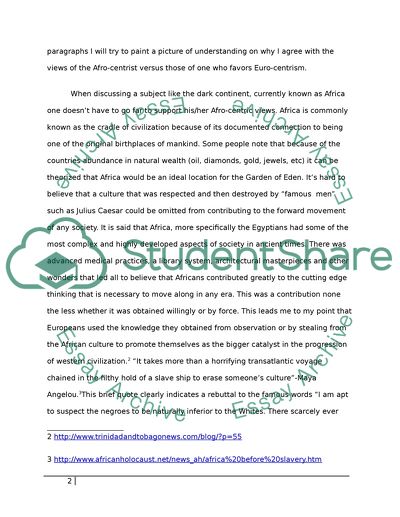Cite this document
(“Eurocentric and Afrocentric Beliefs Research Paper”, n.d.)
Eurocentric and Afrocentric Beliefs Research Paper. Retrieved from https://studentshare.org/culture/1763811-the-main-beliefs-of-afrocentrics-and-eurocentrics-along-with-your-intellectual-input-on-their-disagreements-as-to-who-side-you-side-with-i-chose-to-side-with-afrocentrics
Eurocentric and Afrocentric Beliefs Research Paper. Retrieved from https://studentshare.org/culture/1763811-the-main-beliefs-of-afrocentrics-and-eurocentrics-along-with-your-intellectual-input-on-their-disagreements-as-to-who-side-you-side-with-i-chose-to-side-with-afrocentrics
(Eurocentric and Afrocentric Beliefs Research Paper)
Eurocentric and Afrocentric Beliefs Research Paper. https://studentshare.org/culture/1763811-the-main-beliefs-of-afrocentrics-and-eurocentrics-along-with-your-intellectual-input-on-their-disagreements-as-to-who-side-you-side-with-i-chose-to-side-with-afrocentrics.
Eurocentric and Afrocentric Beliefs Research Paper. https://studentshare.org/culture/1763811-the-main-beliefs-of-afrocentrics-and-eurocentrics-along-with-your-intellectual-input-on-their-disagreements-as-to-who-side-you-side-with-i-chose-to-side-with-afrocentrics.
“Eurocentric and Afrocentric Beliefs Research Paper”, n.d. https://studentshare.org/culture/1763811-the-main-beliefs-of-afrocentrics-and-eurocentrics-along-with-your-intellectual-input-on-their-disagreements-as-to-who-side-you-side-with-i-chose-to-side-with-afrocentrics.


